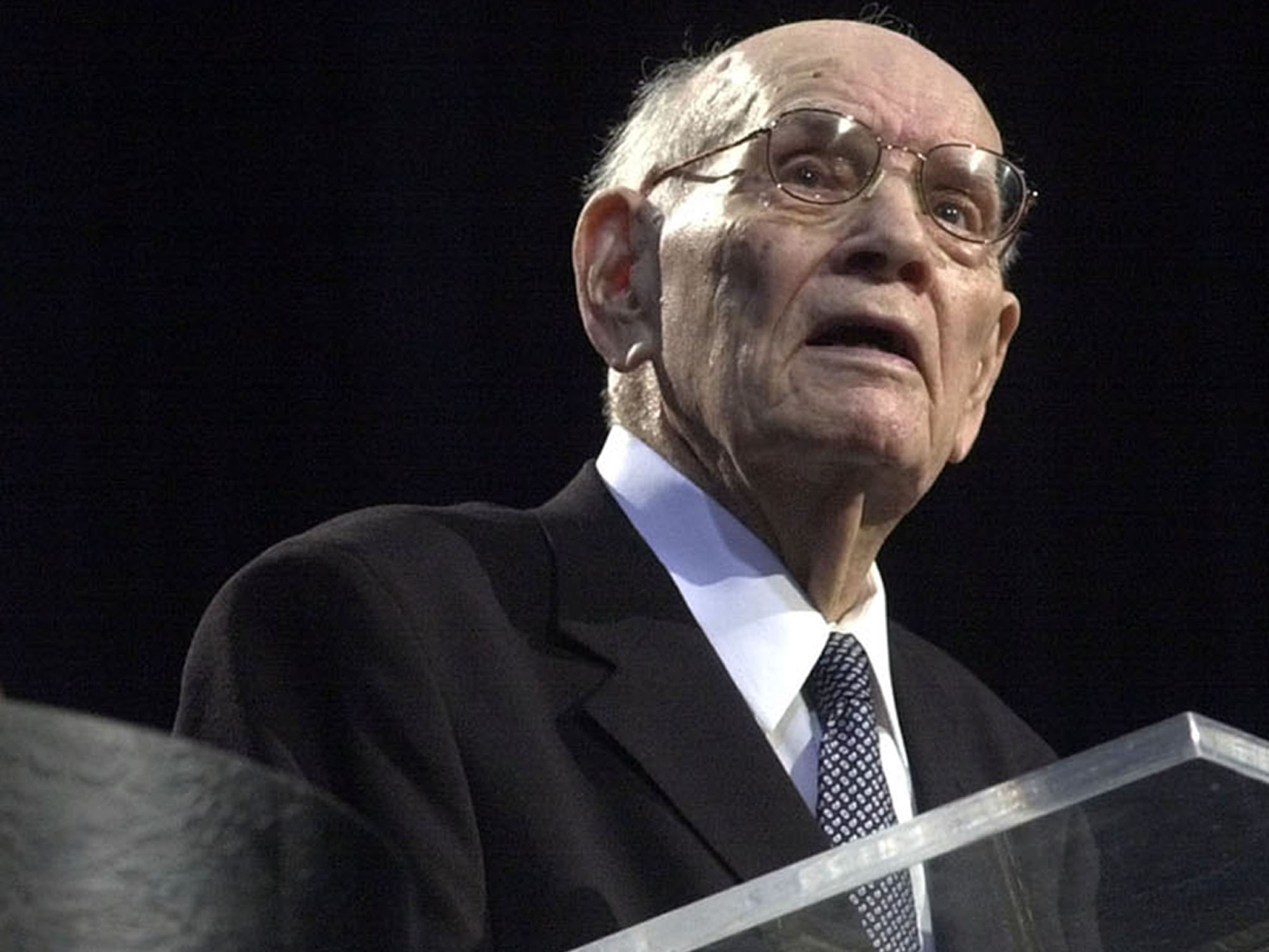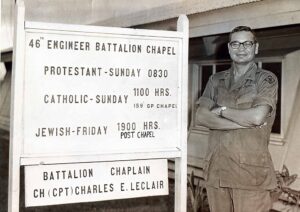
NASHVILLE (BP) — Thirteen years after the death of the man for whom it was named, the 11-story Sullivan Tower was imploded on Saturday (July 21) in Nashville.
But what continues are James L. Sullivan’s monumental legacy as a lifelong Southern Baptist and more than 60 record boxes of his papers in the Southern Baptist Library and Historical Archives.
Sullivan was president of the Baptist Sunday School Board — now LifeWay Christian Resources — from 1953 until his retirement in 1975. The following year, he was elected president of the SBC and served a one-year term.
The first two floors of the Art Deco-style building were completed in 1940; nine more floors were added from 1950 to 1956 and later named for Sullivan. The former 14.5-acre LifeWay site is being developed into a hotel, office buildings, restaurants, retail and entertainment venues. After selling the property, LifeWay relocated to a new facility, also in downtown Nashville.
Sullivan was “one of the truly great leaders in our convention.” said Jimmy Draper, who led LifeWay from 1991 until his 2006 retirement.
The SBC’s strength is “not only because of our devotion to the Scripture as the inerrant Word of God, but also because of spiritual giants who literally saturate the years since 1845 when the SBC was born,” said Draper, also a former SBC president from 1982-1984 and current ambassador for the SBC Executive Committee during its search for a new president.
Draper recounted in extensive comments drafted for today’s Baptist Press story, “When I came to be president of the Baptist Sunday School Board [which changed its name to LifeWay in the late 1990s], I had no better encourager or friend than James Sullivan. One of the great privileges for me was to have frequent visits with him over the 15 years I was there.
 “Solid in his theology with a memory that was remarkable, he always brought words of support and counsel. … He always had a story of something that had happened in his lifetime. I told him one day, ‘Dr. Sullivan, you either have the greatest memory I have ever seen or you have outlived anyone who could challenge what you say.’ With a smile he said, ‘Well, it is probably a little of both!'”
“Solid in his theology with a memory that was remarkable, he always brought words of support and counsel. … He always had a story of something that had happened in his lifetime. I told him one day, ‘Dr. Sullivan, you either have the greatest memory I have ever seen or you have outlived anyone who could challenge what you say.’ With a smile he said, ‘Well, it is probably a little of both!'”
Draper acknowledged that he and Sullivan “differed on the need for the conservative resurgence” in the SBC’s stance on Scripture, “but it was never a point of contention or hostility.”
“He believed that the culture of our SBC was like a football field. There were extremes in both end zones, but the majority of our convention was between the goal lines. … I felt strongly that we had drifted to the left toward liberalism and to a low view of Scripture. Although we differed, he was unwavering in his support for me and in his friendship was always strong.”
The Sunday School Board was one of the primary causes of an extraordinary doctrinal controversy that erupted in 1961 with its publication of a book under the Broadman Press imprint, “The Message of Genesis” by Ralph Elliott, an Old Testament professor at Midwestern Baptist Theological Seminary.
Sullivan never became an ongoing lightning rod in the controversy though Elliott and his book were fiercely criticized by conservative pastors for discounting various historical elements of the Old Testament, such as Adam and Eve as real people and the global breadth of the flood.
Jerry Sutton, in his book on the SBC’s history, “The Baptist Reformation,” called it the “first modern crisis over Scripture among Southern Baptists.” A measure of resolution came through the convention’s adoption of the 1963 Baptist Faith and Message, though conservatives’ concerns continued and found traction in a multi-year movement that began with the election of Memphis pastor Adrian Rogers as SBC president in 1979.
Sullivan described Southern Baptists’ way of doing things — from local congregations and Baptist associations to the state and national conventions supported by churches’ gifts through the Cooperative Program — in his classic book, “Baptist Polity As I See It,” initially published in 1983 and expanded in a 1988 edition.
“Those of us in our 90s can remember what it was like before we had a Cooperative Program,” Sullivan, at age 91, told the SBC annual meeting in New Orleans in 2001.
After being baptized at age 11 into Tylertown (Miss.) Baptist Church, Sullivan said he received a box of offering envelopes divided into two sections — one for the church and one for various Baptist causes. He recalled trying to figure out how to divide in half his tithe of a nickel.
“It was a wonderful day when our pastor and people came back from the [1925] Southern Baptist Convention to report we had the Cooperative Program,” Sullivan said. “We would tithe one offering and then the church would decide how it would give.” He said Tylertown Baptist Church voted to send 40 percent of its undesignated receipts to the Cooperative Program.
“When we put a dollar into the offering plate, it touches the world,” he said.
Draper said Sullivan also was:
— “a remarkable businessman [leading] a huge business. It is the largest distributor of Christian materials in the world that has always lived on the funds that it produced from its materials. … It has never received Cooperative Program funds. It has been a strong supporter of all SBC activities and never more unselfishly than under James Sullivan.
— “a believer in Baptist state conventions, and it was his leadership that brought strong cooperative agreements with the states,” Draper said. “He felt that if the BSSB helped the state conventions, they would be champions of Sunday School ministry in their states. I found that to be true during my presidency and, with his counsel, I had strong relationships with the state executive directors who lead those state conventions.”
— a committed churchman. “He told me shortly after I came to the Baptist Sunday School Board something every Baptist needs to realize. He said, ‘When you left the pastorate of a local Baptist church to become president of BSSB, you took a step down.’ He believed that the local church was truly Baptist headquarters.” Both Sullivan and Draper served churches in several states before assuming their SBC leadership posts.
And he had a down-to-earth graciousness, said Linda Lawson Still, who retired in 2002 as LifeWay’s director of communications after 31 years with the entity, earlier serving as editor of Facts and Trends magazine for church staff, two magazines for teens and assistant editor of Home Life magazine.
“A lingering memory I have of James L. Sullivan is observing him eating lunch in the cafeteria while conversing with coworkers,” Still said in email comments to Baptist Press. “He didn’t look around for senior staff members to sit with. He seemed as comfortable talking with employees from editing components, maintenance or distribution as with leaders of the Southern Baptist Convention. Without fail, he treated each of us with kindness and respect. He loved to tell stories and never minded laughing at himself.”
Still told of once enlisting a high school senior from the Nashville area to interview Sullivan for an article in connection with his approaching retirement in 1975.
The student “arrived in my office determined but terrified of asking questions of the president of the Sunday School Board,” Still said. “I accompanied her to Dr. Sullivan’s seventh-floor office. He came out from behind his desk to greet her. After they sat down, he began asking her questions out of a genuine interest in his guest. I could see her visibly relaxing. The outcome of that meeting was an excellent article written from a teen’s perspective for Christian teenagers portraying a true Christian gentleman.”
Draper recounted that the last visit he had with Sullivan was in the hospital shortly before he died. “He was discussing his funeral with his daughter Beth. He told me in that visit, ‘You reach a place in life where death is your friend.’ He lived courageously, as his stand supporting the 1953 Supreme Court decision for desegregation caused him to be so harassed for that stand that he received many death threats. He had to move his family out of Nashville to a suburban area in order to get better security.
“I don’t think most folks in our convention ever realized what a true champion of biblical values and principles he was, even if it was controversial,” Draper said. “He stood strong as a Southern Baptist leader, and he died with complete confidence in the Lord he loved and served so faithfully.”














